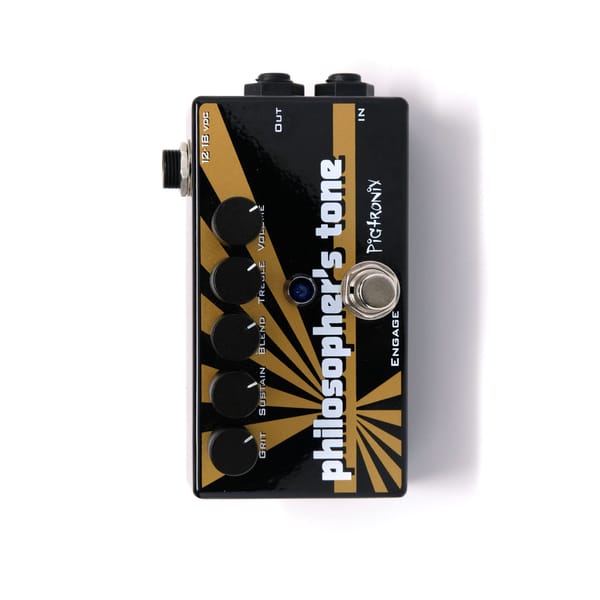Noise Boyz Review
A compressor to give you a solid boost with great sustain when you need it, but which you probably don’t want to use exclusively as an overdrive/distortion.
I find compressor pedals particularly difficult to write about. To me in terms of their practical use, they add just a little ‘extra something’ to your sound so there aren’t quite as many permutations to try with them (as opposed to the vast array of distortion tones available that fundamentally change your tone). But I picked up the philosopher’s tone because 1) I had heard good things about pigtronix and 2) I liked the name (yes that’s a good enough reason for me to try a new pedal) and found that it does what it is supposed to do very well. Below I wanted to walk you through some samples that were played with both the pedal on and off so you can hear what it does to the tone. In this first sample I played through the
For this next sample I turned off the distortion so you can hear how the philosopher’s tone sounds on clean notes – again, it gives a bit more fullness to the sound without changing much of the original tone, which is especially important for clean tones.
For this next sample I turned the girt up to around the 3 position – it adds just a little bit extra dirt to the distortion, just as a good compressor should.
For this final sample, I turned grit back down to zero but upped the sustain to 100, which is the setting I would use for shred-style guitar solos to really make them cut through the rest of the mix.
Just for kicks I decided to record one sample with the grit at 50 and the sustain at 100 so you could hear what it would sound like if you wanted to use this pedal solely as your distortion – based on the sample below, I wouldn’t recommend it (especially when we have some really great distortions here like the
To sum things up, if you’re looking for a little extra boost and sustain without changing the natural sound of your clean or distorted setting, a compressor is the way to go and the philosopher’s tone delivers exactly what it needs to. If you’ve never tried a compressor before, you should definitely give it a shot…
Tech Specs
Input
1 x 1/4"
Output
1 x 1/4"
Power Supply
9v
Width
2 inches
Depth
4 inches
Height
2 inches
Weight
0.4875 lbs.
How It Works
Choose a Plan
Pick how many pedals you want to try a month, from one to three.
Play Them All
Try every signal-chain you can imagine until you find the tone that’s right for you.
Keep, Swap, or Buy
Keep the pedals you rent for as long as you want. Love them? Buy them. Hate them? Swap them.






